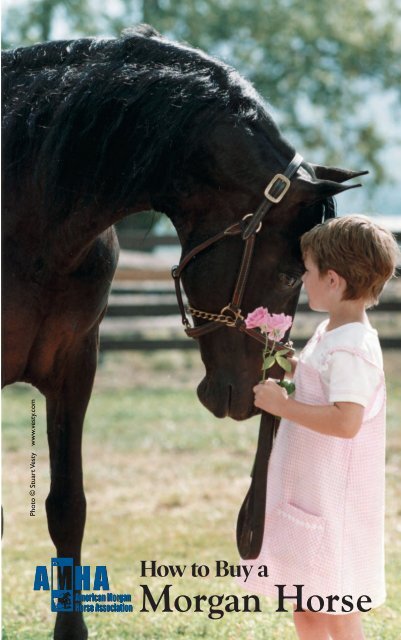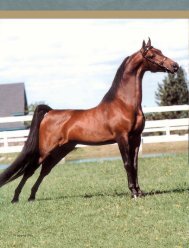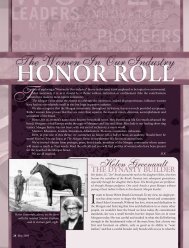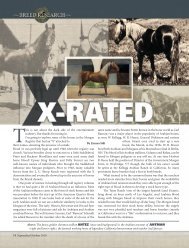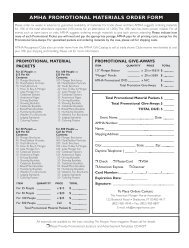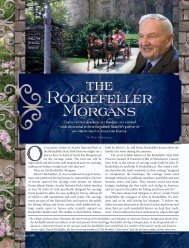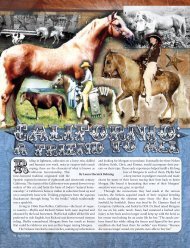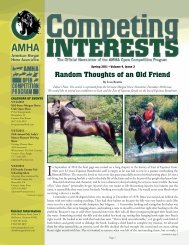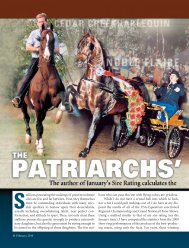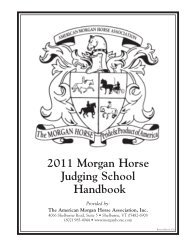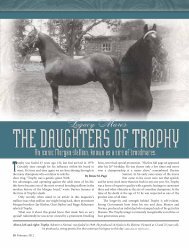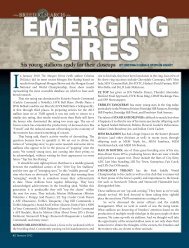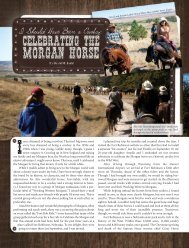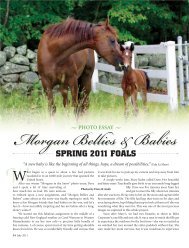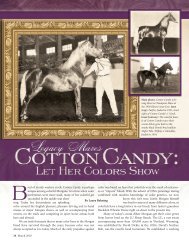buy a Morgan - American Morgan Horse Association
buy a Morgan - American Morgan Horse Association
buy a Morgan - American Morgan Horse Association
You also want an ePaper? Increase the reach of your titles
YUMPU automatically turns print PDFs into web optimized ePapers that Google loves.
Photo © Stuart Vesty www.vesty.com<br />
How to Buy a<br />
<strong>Morgan</strong> <strong>Horse</strong>
3 Introduction<br />
Become a Member of the<br />
<strong>American</strong> <strong>Morgan</strong> <strong>Horse</strong> <strong>Association</strong><br />
3 Examine Your Resources<br />
Time<br />
Money<br />
Skills<br />
5 Selecting the <strong>Morgan</strong> <strong>Horse</strong><br />
Temperament<br />
Size<br />
Age<br />
Gender<br />
Level of Training<br />
Suitability to Discipline<br />
7 The <strong>Morgan</strong> Standard of Perfection<br />
8 Breeding and Bloodlines<br />
8 Finding <strong>Morgan</strong> <strong>Horse</strong>s for Sale<br />
The AMHA<br />
Competitions<br />
Local Publications<br />
The Internet<br />
Sales<br />
9 Communicating With the Seller<br />
Caveat Emptor<br />
Videos/Photos<br />
Competition Records<br />
Care Records<br />
Daily Handling<br />
Training History<br />
Trying the <strong>Horse</strong><br />
Price<br />
Commissions<br />
Deposits<br />
Payment Terms<br />
Warranties/Guarantees<br />
Trial Periods<br />
12 The Purchase Process<br />
The Pre-Purchase Exam<br />
Documentation<br />
Leasing<br />
Insurance<br />
14 Conclusion<br />
14 Resources<br />
2
INTRODUCTION<br />
The selection and purchase of your <strong>Morgan</strong><br />
horse is the first step to an involvement with<br />
the <strong>Morgan</strong> world that can be one of the<br />
most rewarding and enjoyable experiences you<br />
will ever have. The information in this booklet<br />
will help guide you through the process of<br />
selecting and purchasing the <strong>Morgan</strong> horse<br />
that is right for you. While this booklet will<br />
provide you with a lot of answers about<br />
selecting and <strong>buy</strong>ing your new <strong>Morgan</strong>, you<br />
will discover many questions for which you<br />
will have to find your own answers. The<br />
answers to those questions will determine in<br />
large measure what <strong>Morgan</strong> is right for you.<br />
The more diligent you are in asking those<br />
questions, and the better you understand the<br />
answers, the better the relationship you and<br />
your new <strong>Morgan</strong> will have.<br />
Become a Member of the <strong>American</strong><br />
<strong>Morgan</strong> <strong>Horse</strong> <strong>Association</strong><br />
You will find many references in this booklet as<br />
to how the <strong>American</strong> <strong>Morgan</strong> <strong>Horse</strong><br />
<strong>Association</strong> (AMHA) can be of valuable assistance<br />
to you before, during, and after the purchase<br />
of your <strong>Morgan</strong>. Perhaps the first order<br />
of business is to become an AMHA member.<br />
EXAMINE YOUR RESOURCES<br />
The first step in the selection of a <strong>Morgan</strong><br />
horse that will meet your expectations and be<br />
capable of delivering the full potential of the<br />
<strong>Morgan</strong> experience involves some examination<br />
of your resources. As a horse owner, you<br />
have the obligation to care for your new<br />
<strong>Morgan</strong> properly. Before you <strong>buy</strong> a horse,<br />
be sure you understand what your responsibilities<br />
will be and how they will be carried<br />
out. If a <strong>Morgan</strong> is to be your first horse,<br />
the assistance of experienced <strong>Morgan</strong> owners<br />
and professional <strong>Morgan</strong> trainers can be<br />
invaluable. They can help you assess your<br />
needs, resources, and goals to help steer you<br />
to the right horse. The AMHA can provide<br />
you with a list of <strong>Morgan</strong> owners and<br />
trainers in your area who will be glad to<br />
assist you in finding and purchasing your<br />
first <strong>Morgan</strong> horse.<br />
Time<br />
Your enjoyment of <strong>Morgan</strong> horse ownership<br />
will significantly improve if, in the very beginning<br />
of the process, you closely examine your<br />
available resources. Of particular importance<br />
is time. How much time can you devote to<br />
your <strong>Morgan</strong> How you answer this question<br />
will make a tremendous difference to the cost<br />
of horse ownership. Do you have time to care<br />
for your horse at home Maintaining a stable<br />
at home can be very enjoyable, but it will<br />
require a commitment of your time with your<br />
horse. It is important to remember that this<br />
will be time in addition to the pure recreational<br />
time with your <strong>Morgan</strong>. If you do not<br />
have time to maintain a stable by yourself, you<br />
may want to consider paying for some extra<br />
3
help at home, or it may make sense to board<br />
your <strong>Morgan</strong> at a facility where its routine<br />
daily care can be done for you so your time<br />
can be used for trail riding, driving, lessons,<br />
competitions, etc.<br />
Money<br />
It is often said that <strong>buy</strong>ing the horse is the<br />
cheapest part. It is unfair to your <strong>Morgan</strong> to<br />
<strong>buy</strong> it and then discover your financial<br />
resources will not allow you to care for it<br />
properly. Annual care and maintenance costs<br />
vary greatly depending on many things. A<br />
horse turned out to pasture year round will<br />
cost considerably less than a youngster in fulltime<br />
professional training. <strong>Horse</strong> care costs<br />
also vary depending on where you live.<br />
Fortunately <strong>Morgan</strong>s are relatively inexpensive<br />
to feed and care for, and are known as<br />
“easy keepers.” Ask local horse owners about<br />
the costs of various types of horse care in<br />
your area. Before you <strong>buy</strong> your <strong>Morgan</strong>,<br />
understand there is a huge difference between<br />
a hobby and a business in the horse world.<br />
The vast majority of <strong>Morgan</strong> owners own<br />
their <strong>Morgan</strong>s purely for recreational enjoyment.<br />
If you are considering entering the<br />
<strong>Morgan</strong> world from a business standpoint,<br />
talk first with your financial advisers and other<br />
people already engaged in the facet of the<br />
<strong>Morgan</strong> business that interests you. Engaging<br />
in a business with horses, like any business<br />
endeavor, usually involves significant financial<br />
resources, a clear business plan, and a serious<br />
long-term commitment. If you are going to<br />
own horses for pure recreation, be realistic<br />
about the chances of your hobby returning<br />
income. For many families with children, time<br />
with their <strong>Morgan</strong> is time together, and that<br />
has rewards money can’t <strong>buy</strong>.<br />
The price of your new <strong>Morgan</strong> will vary<br />
depending on the horse’s age, breeding, level<br />
of training, competitive ability, and overall<br />
quality as a representative of the <strong>Morgan</strong><br />
breed. Prices also vary slightly depending on<br />
geographic location. As the popularity of the<br />
<strong>Morgan</strong> breed spreads to other countries,<br />
even currency exchange rates can come into<br />
play. Once you have a clear determination of<br />
your specific needs, stick to your selected criteria<br />
and, when you find the right <strong>Morgan</strong>, be<br />
willing to pay just a little bit more if you can.<br />
You will not regret it.<br />
Skills<br />
In selecting the right <strong>Morgan</strong> horse, you must<br />
assess your own equine skills. If you are<br />
already an experienced rider or driver, most<br />
likely you have a clear idea about the level of<br />
training and ability your new horse already<br />
should have. However, if you do not have<br />
much horse experience, consider taking some<br />
lessons with a professional trainer in order to<br />
assess your skill level and make a better determination<br />
of the training level your new<br />
<strong>Morgan</strong> should have to match your skills.<br />
While it is an attractive idea to <strong>buy</strong> a horse to<br />
“move up to” in terms of your own skills, it<br />
may prove to be very frustrating to own a<br />
horse you cannot enjoy because it is too<br />
advanced for your skill level. If there is any<br />
question, re-examine your choice and reconsider<br />
<strong>buy</strong>ing a <strong>Morgan</strong> more suitable to your<br />
present skill level.<br />
Will you be selecting a <strong>Morgan</strong> that needs<br />
4
further training Do you have the time and<br />
skill to provide this You may need to consider<br />
placing your <strong>Morgan</strong> in the care of a professional<br />
trainer and recognize that it may<br />
take some additional time for your <strong>Morgan</strong> to<br />
become ready for you to ride and drive on<br />
your own.<br />
SELECTING THE MORGAN HORSE<br />
A horse is more than just a pretty color or a<br />
cute face. Temperament, age, size, gender,<br />
training level, and suitability for your preferred<br />
discipline are just a few of the other<br />
things to consider when you select the right<br />
<strong>Morgan</strong> for you.<br />
Temperament<br />
Most people find that of all the characteristics<br />
possessed by horses, the right temperament<br />
is paramount to an enjoyable relationship.<br />
The <strong>Morgan</strong> breed is blessed with a<br />
wonderful temperament in general. Their<br />
willingness to please is legendary among<br />
horse breeds and endears the <strong>Morgan</strong> to<br />
trainers and owners. However, <strong>Morgan</strong> temperaments<br />
vary from horse to horse and it is<br />
wise for you to spend some time with your<br />
prospective purchase in order to assess its<br />
basic temperament and disposition. If you are<br />
inexperienced at assessing equine temperament,<br />
you should enlist the aid of an experienced<br />
horse person, preferably someone who<br />
has success in matching people to horses.<br />
Once you have located a <strong>Morgan</strong> that seems<br />
to fit your criteria, make arrangements with<br />
the seller to spend some time with this horse<br />
before you purchase it. Be wary of sellers who<br />
are reluctant to allow reasonable visitation.<br />
Size<br />
The <strong>Morgan</strong> Breed Standard of Perfection<br />
calls for horses between 14.2 and 15.2 hands<br />
with some individuals over and under those<br />
heights. The <strong>Morgan</strong> is a very strong and<br />
durable horse for its size and smaller individuals<br />
are generally much more capable than<br />
horses of similar size in other breeds. It is<br />
probably wise to try horses of various sizes<br />
before you make the final determination of<br />
what size is right for you and the uses you<br />
have in mind for your <strong>Morgan</strong>. Do not dismiss<br />
the smaller <strong>Morgan</strong> for children and<br />
small adults. Some people are easily intimidated<br />
by larger horses and find the smaller<br />
<strong>Morgan</strong> quite suitable for their needs. Taller<br />
people generally prefer proportionally taller<br />
horses. Size is an important consideration,<br />
but it should probably not be the highest priority<br />
on your search criteria list.<br />
Age<br />
The <strong>Morgan</strong> horse reaches its physical maturity<br />
at about eight years of age. <strong>Morgan</strong>s are<br />
generally first trained to drive as early as two<br />
years of age and first ridden as early as three<br />
years. At those young ages though, their training<br />
is far from complete and their physical<br />
and mental immaturity enables only limited<br />
use. The advantage of purchasing a young<br />
<strong>Morgan</strong> is that you have more control over its<br />
handling and training than you might have<br />
with an older horse. On the other hand, the<br />
advantages of purchasing an older horse is<br />
that the bulk of its elementary training<br />
should be behind it and it may be ready to<br />
fully enjoy right away. When purchasing an<br />
older horse, you should determine what kind<br />
of handling and training history it has. It may<br />
be good, in which case your new <strong>Morgan</strong> will<br />
be ready to enjoy right away. It may, however,<br />
be unknown or even filled with events that<br />
may take some serious professional handling<br />
to overcome. If your prospect has an<br />
unknown history, it will absolutely benefit<br />
5
you to have a professional evaluation of that<br />
horse before you purchase it.<br />
Do not overlook the teenage <strong>Morgan</strong>!<br />
<strong>Morgan</strong>s generally live long and useful lives<br />
and some of the best <strong>buy</strong>s in the breed are the<br />
teenage <strong>Morgan</strong>s. They have training, experience,<br />
and a history of usability that makes<br />
their suitability for your needs easier to assess.<br />
Chances are a teenage <strong>Morgan</strong> that is still<br />
strong, sound, and healthy will not have tendencies<br />
for lameness or health problems.<br />
Keep in mind that the older horses most likely<br />
will have more mileage, which inevitably<br />
will take some toll. If you are considering an<br />
older <strong>Morgan</strong>, make the effort to determine<br />
what kind of “mileage” your prospective purchase<br />
has had, as it will help you evaluate how<br />
much stress was involved.<br />
Gender<br />
The question of breeding potential in your<br />
prospective purchase is important in certain<br />
situations. If the primary use of your <strong>Morgan</strong><br />
will be breeding, you should be selecting only<br />
stock that meets the highest criteria, especially<br />
in terms of temperament, type, and conformation.<br />
If you are selecting a <strong>Morgan</strong><br />
mare or stallion primarily for use as a performance<br />
horse, the question of breeding<br />
quality may be secondary to other criteria.<br />
The steady, reliable, and consistent temperament<br />
and performance of <strong>Morgan</strong> geldings<br />
often will make up for their lack of breeding<br />
potential and <strong>Morgan</strong> geldings generally<br />
make great choices for family recreational<br />
horses. Probably the most common fault in<br />
selecting horses is the idea that if the horse<br />
6<br />
does not live up to its potential as a performance<br />
horse, one can always use it for breeding.<br />
Only <strong>Morgan</strong> stock that is intentionally<br />
selected for breeding and meets the strictest<br />
criteria in terms of <strong>Morgan</strong> temperament, type,<br />
and conformation should be used to reproduce.<br />
Level of Training<br />
<strong>Horse</strong>s are never too old to learn and<br />
<strong>Morgan</strong>s are wonderful at learning new<br />
things as they get older. The <strong>Morgan</strong> is a versatile<br />
breed and many individuals are very<br />
capable of learning new and different disciplines.<br />
Generally speaking, the inexperienced<br />
rider or driver combined with the inexperienced<br />
horse is not an ideal match, and is best<br />
avoided unless you have professional help that<br />
can help the two of you make it work. If the<br />
<strong>Morgan</strong> horse you have in mind has not<br />
reached the training level that is suitable for<br />
your skills, carefully assess whether you are<br />
willing and able to make the additional<br />
investment of money in training. It can be a<br />
very rewarding educational experience to be<br />
involved with this training, but be realistic<br />
about the time it will take to bring the horse<br />
to your skill level. Seek advice from professional<br />
trainers about what will be involved in<br />
bringing along your <strong>Morgan</strong> to the point<br />
where you can ride or drive it. And remember:<br />
when training horses, faster rarely means better.<br />
Suitability to Discipline<br />
The immediate goal is to <strong>buy</strong> a <strong>Morgan</strong> that<br />
is suitable for the discipline you plan to pursue.<br />
The <strong>Morgan</strong> that is a star as a driving<br />
horse may know little or nothing about saddle<br />
work. That will likely make it unsuitable<br />
for riding disciplines without further training.<br />
Only with the help of a very good, trained,<br />
experienced eye should you try to select a<br />
suitable horse which is not already engaged in<br />
the immediate discipline you plan to pursue.<br />
The hallmark of the <strong>Morgan</strong> breed is its<br />
innate versatility. A <strong>Morgan</strong> with good training<br />
and handling is capable of pursuing and<br />
becoming competent at many different disciplines.<br />
Your purchasing dollar may <strong>buy</strong> you<br />
much more horse for the money than some<br />
other breeds. This becomes an important
An anatomical chart of<br />
THE MORGAN HORSE<br />
<strong>American</strong> <strong>Morgan</strong> <strong>Horse</strong> <strong>Association</strong> Inc.<br />
Crest<br />
Cheek<br />
Poll<br />
Forehead<br />
Face<br />
Nostril<br />
Dock Croup Loin Back Withers<br />
Neck<br />
Muzzle<br />
Chin Groove<br />
Lower Lip<br />
Throat Latch<br />
Line of Shoulder<br />
Buttock<br />
Thigh<br />
Flank<br />
Barrel<br />
Point of Shoulder<br />
Chest<br />
Point of Hock<br />
Stifle<br />
Abdomen<br />
Gaskin<br />
Hock<br />
Girth<br />
Elbow<br />
Chestnut<br />
Forearm<br />
Knee<br />
Cannon<br />
Cannon<br />
Fetlock<br />
Pastern<br />
Hoof<br />
Coronet<br />
Ergot<br />
Heel<br />
Fetlock<br />
Coronet<br />
Pastern<br />
Hoof<br />
consideration as the two of you grow older<br />
together. You may begin with a riding horse<br />
and decide years later that driving would be<br />
more enjoyable. The <strong>Morgan</strong> is up to the<br />
challenge. Many competitive <strong>Morgan</strong>s began<br />
by excelling in one discipline and moved<br />
through several others as they aged and as<br />
their owners changed their desires and priorities.<br />
If you are purchasing an older <strong>Morgan</strong>,<br />
do not underestimate the value of the training;<br />
it may already have had in a discipline or<br />
two that is different from the one for which<br />
you are purchasing it. Your situation may<br />
change or you may decide to sell your <strong>Morgan</strong><br />
at a later date. The better and more extensive<br />
its training, the greater enjoyment and versatility<br />
that horse has for you. And, if you need<br />
to sell your horse, your opportunities for<br />
securing a good home are far better.<br />
7<br />
THE MORGAN STANDARD OF<br />
PERFECTION<br />
The <strong>Morgan</strong> breed has a specific written<br />
description and graphic illustrations of the<br />
ideal type and conformation for the <strong>Morgan</strong><br />
horse. Since this is a description of the ideal<br />
mature <strong>Morgan</strong>, it is best to have an experienced<br />
breeder or trainer help you evaluate<br />
your selection if you are considering a young,<br />
immature <strong>Morgan</strong>. It is wise to keep in mind<br />
that the <strong>Morgan</strong> Standard is a description of<br />
the “ideal” <strong>Morgan</strong>. Obviously, not every<br />
<strong>Morgan</strong> has ideal type and conformation.<br />
The <strong>Morgan</strong> Standard is the benchmark all<br />
breeders strive for, and against which all<br />
<strong>Morgan</strong>s are compared for judging purposes.<br />
You will find many individuals that have<br />
good, but not “perfect” conformation, and<br />
good but not “perfect” <strong>Morgan</strong> type. These<br />
individuals may, however, be perfectly acceptable<br />
and ideally suited for your needs. Of<br />
course, it is wise to evaluate the conformational<br />
deficiencies and what impact they may<br />
have on your intended uses of your new<br />
<strong>Morgan</strong>. Again, an experienced <strong>Morgan</strong> trainer<br />
or breeder as well as a good veterinarian<br />
can provide immeasurable assistance and perhaps<br />
help you avoid disappointments in the<br />
future.
BREEDING AND BLOODLINES<br />
Within the <strong>Morgan</strong> breed are different<br />
bloodlines and closely related family groups.<br />
Each bloodline or combination of bloodlines<br />
has certain physical characteristics and performance<br />
and behavior tendencies. While the<br />
<strong>Morgan</strong> breed is relatively small, sorting out<br />
these bloodline-related characteristics is usually<br />
beyond the scope of the first-time <strong>buy</strong>er<br />
who will be unfamiliar with the various families<br />
and influential horses within the <strong>Morgan</strong><br />
breed. If available, the seller should provide<br />
you with a copy of the <strong>Morgan</strong>’s registration<br />
papers. On it will be listed several generations<br />
of <strong>Morgan</strong>s who contributed to producing<br />
the <strong>Morgan</strong> you are considering. Only those<br />
with actual experience in breeding and/or<br />
training many different <strong>Morgan</strong>s can accurately<br />
advise you on the relative importance of<br />
the ancestors in the pedigree of your prospective<br />
purchase. Ask for the input of a few experienced<br />
breeders and trainers. Keep what they<br />
say in perspective and try to find common<br />
areas where they agree. Each person will color<br />
their views with their own personal preferences<br />
and each person’s experiences are apt to<br />
be somewhat different.<br />
FINDING MORGAN HORSES<br />
FOR SALE<br />
The AMHA<br />
The AMHA can provide you with names and<br />
contact information of <strong>Morgan</strong> owners,<br />
breeders, and trainers in your area who may<br />
have <strong>Morgan</strong>s for sale. They can also provide<br />
you with a list of your local <strong>Morgan</strong> associations,<br />
some of which maintain sales listings<br />
of <strong>Morgan</strong>s for sale.<br />
Competitions<br />
One way to familiarize yourself with the<br />
<strong>Morgan</strong> breed is to attend some horse shows<br />
and competitions where <strong>Morgan</strong>s are competing,<br />
if you are interested in showing your<br />
new <strong>Morgan</strong>. The AMHA can provide you<br />
with dates and locations of competitions in<br />
your area. There you can see <strong>Morgan</strong>s in<br />
action as well as talk to their owners and<br />
trainers in the stable areas. Most will be very<br />
glad to speak with you, however, remember<br />
that trainers are apt to be under some pressure<br />
to ensure all goes correctly with their<br />
horses and under some time constraints in<br />
preparing and showing their horses. It is best<br />
to ask them when they will be free to speak<br />
with you rather than to expect them to immediately<br />
devote their attention entirely to you<br />
while they are involved in competition.<br />
Local Publications<br />
Local publications may list <strong>Morgan</strong>s for sale.<br />
A good place to start is by contacting your<br />
local tack shop. They often have local equine<br />
publications in their shops or will know<br />
which ones are likely to list <strong>Morgan</strong>s for sale<br />
in your area.<br />
The Internet<br />
The Internet is a growing source for leads on<br />
<strong>Morgan</strong>s for sale. Several sites list classified<br />
ads as well as web pages for breeders, trainers,<br />
and owners of <strong>Morgan</strong> horses. You will find<br />
an up-to-date list of <strong>Morgan</strong> horse farms and<br />
general equine websites on the AMHA website<br />
at www.morganhorse.com<br />
8
Sales<br />
Another source of <strong>Morgan</strong>s for sale are public<br />
sales. These generally fall into three categories:<br />
production consignment, and dispersal<br />
sales. A production sale usually is held by<br />
a farm or ranch selling stock that they have<br />
produced themselves from their own breeding<br />
horses. They usually are not selling this stock<br />
“just to get rid of it.” They are using the sale<br />
as way to promote and market the stock they<br />
are proud of and you usually will find very<br />
good individuals in their sale catalog. At a<br />
consignment sale you will find all kinds of<br />
<strong>Morgan</strong>s being sold for all kinds of reasons.<br />
Some are there because their owners have situations<br />
that force the sale of their horses,<br />
some are there just to find new homes, some<br />
unfortunately will be problem horses the<br />
owners find unacceptable. Some consignment<br />
sales offer high quality <strong>Morgan</strong>s and use this<br />
as an efficient means to promote great horses<br />
all in one place. Some consignment sales are<br />
just a means to have the horses change hands.<br />
At dispersal sales you will find horses for sale<br />
by an owner who is going out of business for<br />
any number of reasons. No matter what the<br />
type of sale or the reasons why the horses are<br />
being sold, if you are not experienced in <strong>buy</strong>ing<br />
horses, be sure to have someone who is<br />
advising you. Often sales have veterinarians in<br />
attendance and it may be wise to seek their<br />
advice on things which concern you about the<br />
health or soundness of any of the horses you<br />
may be considering. Auctions are another<br />
avenue you may want to take to find that perfect<br />
<strong>Morgan</strong>.<br />
COMMUNICATING WITH THE<br />
SELLER<br />
Caveat Emptor<br />
Buyer beware. Asking questions is often your<br />
best insurance that what you see is what you<br />
are <strong>buy</strong>ing. Ask why the horse is for sale. The<br />
only dumb question is the one you do not<br />
ask. No seller should be reluctant to answer<br />
your questions or be evasive in his or her<br />
answers. Beware if you are unsatisfied with the<br />
answers or if the seller is not readily forthcoming.<br />
Not all the onus is on the seller to recommend<br />
a suitable horse for you. You have to<br />
be honest in communicating your requirements<br />
and your abilities to the seller. Only<br />
then will they be able to recommend the correct<br />
horse. If they know your requirements,<br />
reputable sellers will not intentionally sell you<br />
an unsuitable <strong>Morgan</strong>.<br />
Videos/Photos<br />
Sellers often have photos or videos of the<br />
<strong>Morgan</strong>s they have for sale and will send<br />
them to you prior to an actual visit. These are<br />
useful tools to help give you some idea of<br />
what the horses are like but be careful not to<br />
place too much importance on what you see.<br />
Sometimes what you really need to know is<br />
not in the video. Use them only as a guide.<br />
Call the seller back if the materials raise more<br />
questions. When viewing videos, remember<br />
that most televisions are not properly<br />
adjusted, particularly in horizontal and<br />
vertical adjustments, and this can present an<br />
inaccurate picture of the horses. Do not<br />
necessarily move on to another horse if the<br />
seller does not have videos or photos readily<br />
9
available, particularly if you are <strong>buy</strong>ing a<br />
<strong>Morgan</strong> from a private owner as opposed to a<br />
professional trainer. Good photos can be hard<br />
to come by and not everyone is equipped to<br />
make a sales video.<br />
Competition Records<br />
Ask for a competition record if the <strong>Morgan</strong><br />
has been shown in competition. The younger<br />
the horse, the shorter the record will be. Do<br />
no necessarily move on to the next <strong>Morgan</strong> if<br />
the horse does not have a performance record.<br />
But do try to find out why it does not exist or<br />
appears to be incomplete. Ask about the level<br />
of competition. All wins are not equal. Be<br />
Photo © Omar Gonzales<br />
reasonable in your expectations of horses that<br />
have won at the local level when they move up<br />
to regional or national levels.<br />
Care Records<br />
Every <strong>Morgan</strong> should have some sort of<br />
record of its vaccinations and worming.<br />
<strong>Morgan</strong>s generally are very hardy, sound horses<br />
but you should ask for a veterinary record<br />
which would list episodes of lameness and illness.<br />
Ask about those incidents if they are<br />
present. Report them to the veterinarian who<br />
may be assisting you with your purchase and<br />
ask them to evaluate their importance. Ask<br />
about stable vices. The <strong>Morgan</strong> breed is relatively<br />
free of stable vices but they do exist.<br />
Some vices are relatively harmless, but others<br />
can be tough to live with and can be detrimental<br />
to the health of the horse.<br />
Fortunately, the <strong>Morgan</strong> breed has few inherent<br />
weaknesses when it comes to feet and legs.<br />
You should ask about the horse’s foot care<br />
and you may wish to speak directly with the<br />
farrier who maintains the horse’s feet.<br />
Daily Handling<br />
Ask about the horse’s regular daily care. The<br />
manner in which it is presently being cared<br />
for may be significantly different than what<br />
you have planned. That difference may be<br />
critical to the attitude and disposition of the<br />
horse, as well as to its physical appearance.<br />
For instance, a horse that is used to being<br />
outside 24 hour a day may change dramatically<br />
in personality if you plan to keep it stabled<br />
for long periods of time. Conversely, a<br />
horse kept stabled most of the time may react<br />
unexpectedly if you plan to keep it outside all<br />
the time. Ask how the horse gets along with<br />
other horses. What is its turnout schedule Is<br />
it apt to be the herd boss, somewhere lower in<br />
the order, or at the bottom Most of the time<br />
none of these positions is more or less desirable<br />
than another, but the answer may give<br />
you some more insight into the personality of<br />
the horse and help you assess how successful<br />
your plans for it may be. Ask the seller to<br />
characterize the horse’s disposition. Is it compatible<br />
with your criteria<br />
Training History<br />
Ask about the horse’s training history. Who<br />
trained it, when, for how long, and in what<br />
way (i.e. western pleasure, carriage, hunt seat,<br />
etc.) Are the answers compatible with your<br />
plans Speak with the person or persons who<br />
trained the horse. Often they can tell you<br />
more about the horse than the seller. Try to<br />
determine what the horse does not know. Are<br />
these things which it will have to learn before<br />
it becomes the <strong>Morgan</strong> of your dreams If so,<br />
how much time, effort, and money will it take<br />
and is the horse likely to learn them<br />
Trying the <strong>Horse</strong><br />
Once you have spoken with the seller and had<br />
your initial questions answered, make an<br />
10
appointment with the seller to see and try the<br />
horse at a time that is convenient for all parties<br />
involved. If you feel unsure about your<br />
ability to assess the horse in any area—<br />
whether it be disposition, conformation, type,<br />
soundness, and/or training level, etc.—it is<br />
unwise to proceed without the help of someone<br />
who has more experience. Keep your eyes<br />
open when you visit the seller. When you first<br />
see the horse, does it appear at first glance to<br />
be the horse that was described to you If you<br />
were told it was 15 hands and bay and it<br />
looks 14.1 hands and a different color, move<br />
on to the next seller. Try to assess the disposition<br />
of the horse, not only while it is being<br />
ridden or driven but at all times when you are<br />
together. You may learn a lot about the horse<br />
by how it has been, or is being, kept.<br />
When trying the horse, always ask to see<br />
it being ridden or driven by its handler before<br />
you try it yourself. Never ride or drive a horse<br />
you are not positively certain can perform at<br />
least the basics for you. If you are <strong>buy</strong>ing a<br />
horse to “grow into” as your skills improve,<br />
take an accomplished rider or driver with you<br />
and have him or her try the horse for you. Do<br />
not rely on the seller to do this for you unless<br />
you know him or her to be reputable.<br />
Price<br />
Obviously the price of the horse must be<br />
within your budget. Often the asking price<br />
can be negotiated. However, do not waste<br />
your time or the seller’s time trying horses out<br />
of your price range. Find out how firm the<br />
horse’s price is before you try it. Purchase<br />
negotiations can be quite simple or quite<br />
complex depending on many factors. If the<br />
horse meets your needs but is slightly beyond<br />
what you planned to spend, in the long run it<br />
may be worth the extra money up front to<br />
own exactly the <strong>Morgan</strong> you want. You may<br />
also find that you and the seller can work out<br />
a deal that is comfortable for both of you.<br />
Sellers usually are pretty good at making<br />
adjustments in order to sell their horses. On<br />
the other hand they usually know what their<br />
horses are worth, and expecting them to drop<br />
their price significantly just because you cannot<br />
afford to pay more is unrealistic.<br />
Commissions<br />
Often, commissions are involved with the sale<br />
of horses. It is wise to ask about them. Who<br />
is receiving them Who is paying them How<br />
much are they There can be commissions<br />
paid by the owner of the horse to whomever<br />
helped to prepare the horse and facilitate the<br />
sale. There may also be commissions or finder’s<br />
fees paid by the <strong>buy</strong>er to whomever<br />
helped to find just the right <strong>Morgan</strong> for the<br />
<strong>buy</strong>er. The amounts of these commissions<br />
vary with the individuals involved. If com-<br />
11<br />
missions are involved, it should be clear to<br />
everyone involved with the sale who pays<br />
them, who receives them, and how much they<br />
are. This information should be specified in<br />
writing in the purchase and sale contract.<br />
Deposits<br />
After you and the seller have agreed to the<br />
price and terms of the sale, often a deposit is<br />
involved. This can be a conditional deposit<br />
which will be refunded only under certain<br />
conditions. For instance, it may be refundable<br />
on a pregnant broodmare if she is determined<br />
prior to the completion of the sale not to be<br />
in foal. Or it may be refundable subject to<br />
certain negative findings from a pre-purchase<br />
exam by your veterinarian. The deposit may<br />
also be applied to the purchase price at the<br />
time the purchase and sale contract is signed.
If you pay a deposit in advance of the sale,<br />
make sure you fully understand the terms and<br />
conditions that apply to it.<br />
Payment Terms<br />
Sometimes sellers will extend payment terms<br />
for their horses. Since a horse is a living,<br />
breathing animal, such arrangements can<br />
sometimes be quite complicated, especially if<br />
breeding options are involved. Such arrangements<br />
can and do work for both the <strong>buy</strong>er<br />
and the seller, but usually it is better to pay<br />
for the horse in full and own it outright from<br />
the signing of the purchase and sales contract.<br />
Warranties/Guarantees<br />
The legal intricacies of warranties and guarantees<br />
vary from state to state. You may wish<br />
to check with a legal adviser if you are concerned<br />
about them. Clauses that address them<br />
should be included in the purchase and sales<br />
agreement. Do not sign one until you are satisfied<br />
they are present in the contract and that<br />
they will hold up in the event of problems<br />
after the sale. Sometimes conditions or stipulations<br />
will apply to the sale of a horse. These<br />
might take the form of describing or restricting<br />
the use for which the horse is being sold,<br />
such as for breeding purposes only. The seller<br />
may know things about the horse that they<br />
may wish to stipulate prior to the sale. For<br />
instance, the seller may know the horse has a<br />
stable vice or is unable to be bred and wish to<br />
make certain you are aware of it. These types<br />
of conditions and stipulations should be<br />
specifically written into the purchase and sale<br />
agreement.<br />
Trial Periods<br />
Some sellers will offer trial periods during<br />
which the <strong>buy</strong>er can live with the horse to further<br />
assess its suitability and compatibility<br />
with you and its new environment. The structure<br />
of trial period agreements will vary<br />
greatly from seller to seller. Inquire about it,<br />
but don’t expect it. The terms of such an<br />
arrangement should be precisely spelled out<br />
in writing beforehand to avoid any misunderstandings.<br />
Instead of an official trial period,<br />
most sellers will gladly make reasonable time<br />
available to <strong>buy</strong>ers to spend some time with<br />
the horses before actually <strong>buy</strong>ing them. This<br />
is a courteous gesture and you should return<br />
it by being reasonable in your requests.<br />
THE PURCHASE PROCESS<br />
The Pre-Purchase Exam<br />
Once you have determined that the horse<br />
meets all your requirements, it is a good practice<br />
to have a veterinarian of your choosing<br />
perform a pre-purchase exam. Out of conflict<br />
of interes concerns, most veterinarians will<br />
not perform pre-purchase exams if they<br />
already are employed by the seller. The<br />
<strong>American</strong> <strong>Association</strong> of Equine<br />
Practitioners can help you locate a veterinarian<br />
qualified to perform an equine pre-purchase<br />
exam, and their contact information is<br />
in the Resource Section of this handbook.<br />
The results of a pre-purchase exam should<br />
give you a picture of the physical condition of<br />
the horse on the day it was performed. It may<br />
give you some idea about what its life was like<br />
up to that point as your vet may find existing<br />
evidence of previous injury. It may also give<br />
you some ideas about the future soundness of<br />
the horse. Obviously your vet cannot predict<br />
the future or reconstruct the past with 100<br />
percent accuracy, but he or she may be able to<br />
uncover warning signs of future problems<br />
based on his or her findings. It makes a lot of<br />
sense for you to be present at the pre-purchase<br />
exam, if at all possible. This will allow<br />
you to discuss findings with your veterinarian<br />
12
as they are made. Such discussions may save<br />
you money and will undoubtedly influence<br />
how the examination proceeds. One of the<br />
most common ways to proceed with a veterinary<br />
pre-purchase exam is to start with the<br />
rudimentary checks on the eyes, heart, lungs,<br />
teeth, and a basic soundness evaluation.<br />
Suspicious or obvious defects should be<br />
noted. Those findings may be enough to<br />
cause you to reject the horse for your purposes<br />
at that point. If you decide to investigate<br />
further, the examination should then proceed<br />
with a more indepth analysis. Flexion tests of<br />
the limbs may indicate the existence of problems<br />
which may need further investigation. X-<br />
rays of the feet and the perhaps joints higher<br />
up the leg may be in order. Whether these are<br />
necessary will depend on the individual<br />
horse’s age and condition, your intended use,<br />
and how much maintenance you are willing to<br />
commit to in order to keep you future horse<br />
healthy and sound. If you plan to use your<br />
new <strong>Morgan</strong> for breeding, your veterinarian<br />
should examine it with that in mind. They<br />
should be able to give you fairly accurate fertility<br />
predictions. If the horse already has<br />
been used for breeding, ask the seller for any<br />
breeding records they have. Once the examination<br />
is complete and you understand the<br />
ramifications of any problems that were<br />
uncovered, it is up to you to decide if you are<br />
willing and able to live with any problems.<br />
Your veterinarian can help you determine<br />
what may be involved, but only you can determine<br />
whether you can live with them. If you<br />
feel unqualified to make the determination,<br />
rely on your veterinarian’s expert opinion or<br />
that of any experienced advisers who are helping<br />
you with your purchase decisions.<br />
Documentation<br />
Once you are satisfied that you have found a<br />
suitable <strong>Morgan</strong> and with the findings of the<br />
prepurchase exam, it is time to sign the<br />
Purchase and Sale Agreement. Not every contract<br />
will be the same and sellers usually have<br />
a form they prefer. There are, however, some<br />
clauses which should be in every contract,<br />
such as the name of the owner who is selling<br />
the horse; who the seller’s agent is, if any;<br />
commissions involved; the date of the transaction;<br />
the name, description, and AMHA<br />
registration number of the horse; the price of<br />
the horse; and how payment is to be made.<br />
Clauses about warranties, guarantees, and<br />
other stipulations as applicable to this particular<br />
horse, who will pay for the registration<br />
transfer (or who will pay for the registration<br />
if it is not already registered) should also be<br />
included. Generally speaking it is a good idea<br />
for the <strong>buy</strong>er to secure a signed registration<br />
transfer form from the seller and to send it to<br />
the AMHA themselves, but some sellers prefer<br />
to do it. (Transfer forms are available from<br />
the AMHA.) If the <strong>Morgan</strong> is not already<br />
registered, make sure it is eligible. If you have<br />
questions about the eligibility contact the<br />
AMHA Registry. In any event, how and when<br />
the official transfer and updated registration<br />
papers of the horse are to be handled should<br />
be in writing in the Purchase and Sale<br />
Agreement. Both <strong>buy</strong>er and seller should<br />
retain signed copies.<br />
Leasing<br />
While it is beyond the scope of this booklet,<br />
leasing can sometimes be a reasonable alternative<br />
to purchase and is mentioned here only<br />
because it may provide some benefits to both<br />
the owner/lessor and the lessee. This may be<br />
especially true if you are not entirely sure<br />
horse ownership is for you. It does provide a<br />
way for you to experience life with horses<br />
without the risk and commitment of outright<br />
ownership.<br />
13
Insurance<br />
Should you insure your new purchase As a<br />
general rule of thumb, if you cannot afford to<br />
incur a total loss on your equine investment<br />
or a loss would present a significant hardship<br />
for you, then, yes, you should insure your<br />
<strong>Morgan</strong>. You may wish to insure your new<br />
<strong>Morgan</strong> anyway for your own peace of mind<br />
and to help with the possible expenses should<br />
disaster strike. The best time to start any<br />
insurance is at the moment of purchase.<br />
CONCLUSION<br />
If at any time during your search for the perfect<br />
<strong>Morgan</strong> horse you have any questions not<br />
answered in this booklet, please contact the<br />
AMHA. They will make every effort to<br />
answer your questions or put you in touch<br />
with someone who can. Once you have purchased<br />
your new <strong>Morgan</strong> you will be ready to<br />
join the other <strong>Morgan</strong> lovers in learning more<br />
about the breed and the AMHA. The<br />
AMHA offers many programs for you and<br />
your <strong>Morgan</strong> and your support through<br />
membership in the <strong>Association</strong> will not only<br />
benefit you, it will help promote and preserve<br />
the wonderful <strong>Morgan</strong> horse!<br />
About the Author<br />
The author, Jeff Morse, learned to ride on Abbington Of<br />
Shady Lawn, the 1949 National Champion <strong>Morgan</strong><br />
Mare. He spent 12 summers as a youth at Green<br />
Meads Farm riding <strong>Morgan</strong>s and attending the New<br />
England <strong>Morgan</strong> Shows. He returned to Green Meads<br />
Farm as manager in 1974. He has served as vice president<br />
of the New England <strong>Morgan</strong> <strong>Horse</strong> <strong>Association</strong><br />
and president and treasurer of the Massachusetts<br />
<strong>Morgan</strong> <strong>Horse</strong> <strong>Association</strong>. He has been the chairman of<br />
the Massachusetts <strong>Morgan</strong> <strong>Horse</strong> Show since 1989. He<br />
currently is training <strong>Morgan</strong> horses with an emphasis on<br />
carriage driving at Green Meads Farm in Richmond,<br />
Massachusetts.<br />
RESOURCES<br />
<strong>American</strong> <strong>Morgan</strong> <strong>Horse</strong> <strong>Association</strong><br />
4066 Shelburne Road, Suite 5 • Shelburne, VT 05482-6908 • phone: (802) 985-4944<br />
Fax: (802) 985-8897 • e-mail: info@morganhorse.com • website: www.morganhorse.com<br />
<strong>American</strong> <strong>Association</strong> of<br />
Equine Practicioners<br />
4075 Iron Works Parkway<br />
Lexington, KY 40511-8434<br />
859/233-0147, fax 859/233-1968<br />
www.aaep.org<br />
<strong>American</strong> Driving Society<br />
P.O. Box 278, Cross Plains, WI 53528<br />
608/237-7382, fax 608/237-6468<br />
www.americandrivingsociety.org<br />
E-mail: info@americandrivingsociety.org<br />
<strong>American</strong> Endurance Ride Conference<br />
11960 Heritage Oak Place, Suite 9,<br />
Auburn, CA 95603<br />
530/823-2260, fax 530/823-7805<br />
www.aerc.org<br />
14<br />
<strong>American</strong> Farriers <strong>Association</strong><br />
4059 Iron Works Parkway, Suite 2<br />
Lexington, KY 40511<br />
859/233-7411, fax 859/231-7862<br />
www.americanfarriers.org<br />
E-mail: farriers@americanfarriers.org<br />
<strong>American</strong> <strong>Horse</strong> Council<br />
1700 K St. NW Ste 300,<br />
Washington D.C., 20006<br />
202/296-4031, fax 202/296-1970<br />
www.horsecouncil.org<br />
E-mail: ahc@horsecouncil.org
<strong>American</strong> Part-Blooded <strong>Horse</strong> Registry<br />
12294 SE 104th Ct.<br />
Portland, OR 97267<br />
503/698-8615<br />
www.apbhorseregistry.com<br />
<strong>American</strong> <strong>Morgan</strong> <strong>Horse</strong> Institute, Inc.<br />
P.O. Box 519<br />
Shelburne, VT 05482-0519<br />
802/985-8477, fax 802/985-8430<br />
E-mail: AMHIOffice@aol.com<br />
<strong>American</strong> Veterinary Medical <strong>Association</strong><br />
1931 N. Meacham Rd., #100<br />
Schaumburg, IL 60173-4360<br />
800/248-2862, fax 847/925-1329<br />
www.avma.org<br />
E-mail: avmainfo@avma.org<br />
Carriage <strong>Association</strong> of America<br />
3915 Jay Trump Rd.<br />
Lexington, KY 40511<br />
859/231-0971<br />
www.caaonline.com<br />
National Animal Poison Control Center<br />
College of Veterinary Medicine<br />
University of Illinois<br />
Urbana, IL 61801<br />
888-426-4435<br />
www.aspca.org<br />
National Cutting <strong>Horse</strong> <strong>Association</strong><br />
260 Bailey Ave., Ft. Worth, TX 76107<br />
817/244-6188, fax 817/244-2015<br />
www.nchacutting.com<br />
National Museum of the <strong>Morgan</strong> <strong>Horse</strong><br />
P.O. Box 700<br />
Shelburne, VT 05482-0700<br />
802/985-8665, fax 802/985-5242<br />
members.tripod.com/~NMMH/<br />
E-mail: morgans@together.net<br />
National Reining <strong>Horse</strong> <strong>Association</strong><br />
3000 NW 10th St.<br />
Oklahoma City, OK 73107<br />
405/946-7400, fax 405/946-8410<br />
www.nrha.com<br />
E-mail: media@nrha.com<br />
North <strong>American</strong> Riding For the<br />
Handicapped<br />
P.O. Box 33150, Denver, CO 80233<br />
303/452-1212, fax 303/252-4610<br />
www.narha.org<br />
North <strong>American</strong> Trail Ride Conference<br />
P.O. Box 2136<br />
Ranchos de Taos, NM 87557-2136<br />
505/751-4198<br />
www.natrc.org<br />
E-mail: natrc@natrc.org<br />
United States Dressage Federation<br />
4051 Iron Works Parkway<br />
Lexington, KY 40511-8434<br />
859/971-2277, fax 859/971-7722<br />
www.usdf.org<br />
E-mail: usdressage@navix.net<br />
United States Eventing <strong>Association</strong><br />
525 Old Waterford Rd., NW<br />
Leesburg, VA 20176<br />
703/779-0440, fax 703/779-0550<br />
www.eventingusa.com<br />
E-mail: info@eventingusa.com<br />
United Professional <strong>Horse</strong>man’s <strong>Association</strong><br />
4059 Iron Works Parkway<br />
Lexington, KY 40511-8434<br />
859/231-5070, fax 859/255-2774<br />
www.uphaonline.org<br />
E-mail: uphakgr@aol.com<br />
USA Equestrian<br />
4047 Iron Works Parkway<br />
Lexington, KY 40511-8434<br />
859/231-5070, fax 859/255-2774<br />
www.equestrian.org<br />
15
Photo © Edwards<br />
4066 Shelburne Road, Suite 5<br />
Shelburne,VT 05482-6908<br />
Telephone: (802) 985-4944<br />
Fax: (802) 985-8897<br />
E-mail: info@morganhorse.com<br />
Website: www.morganhorse.com


